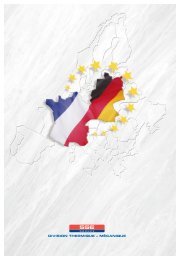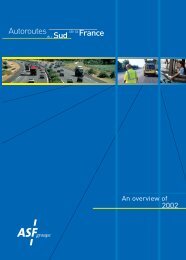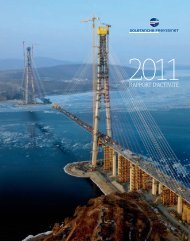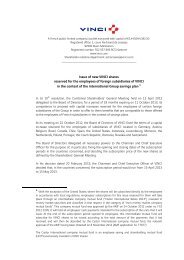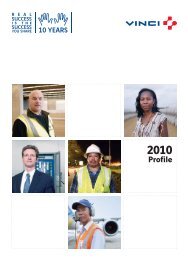VINCI - 2005 annual report
VINCI - 2005 annual report
VINCI - 2005 annual report
Create successful ePaper yourself
Turn your PDF publications into a flip-book with our unique Google optimized e-Paper software.
DEVELOPING SKILLS<br />
<strong>VINCI</strong>’s training approach combines<br />
decentralised organisation and a strong<br />
commitment to developing synergies<br />
within the Group. Almost 2 million hours<br />
of training were organised across all <strong>VINCI</strong><br />
entities in <strong>2005</strong>, up 23% compared with<br />
2004.<br />
Each business line has developed internal<br />
training centres (see table below) adapted to its<br />
particular activities. External training<br />
institutions are used to complement the<br />
programmes organised internally by<br />
subsidiaries, focusing mainly on technical<br />
subjects and management. In France, <strong>VINCI</strong><br />
companies are gradually implementing the<br />
law on the individual’s right to vocational<br />
training (DIF) for their employees.<br />
Group companies also participate in<br />
the development of targeted training<br />
programmes in partnership with specialised<br />
organisations. In France, Sogea<br />
Construction delivers technical training<br />
for students preparing the new civil<br />
engineering and pipe systems high school<br />
diplomas.<br />
GTM Construction has signed a partnership<br />
agreement with the French Ministry<br />
of Education to welcome teachers to its<br />
training centres. Every year, Eurovia<br />
provides training to dozens of young<br />
people without qualifi cations at its<br />
Gevrey-Chambertin centre, near Dijon.<br />
Its programmes lead to an initial diploma<br />
in civil engineering recognised by the<br />
French Ministry of Education. In the Czech<br />
Republic, SSZ, a Eurovia subsidiary,<br />
participated in the creation of a common<br />
apprenticeship centre for the road industry<br />
in <strong>2005</strong>.<br />
In the Netherlands, Actemium (<strong>VINCI</strong><br />
Energies) has developed a theoretical and<br />
practical training module in partnership<br />
Development of internal training centres<br />
Training centres<br />
with four electricity and industrial<br />
automation training institutes in the<br />
Eindhoven area. This programme, designed<br />
for engineering students and technicians,<br />
consists of nine online training modules<br />
(Web Based Learning Industrial Automation).<br />
It is supplemented by practical<br />
sessions on installation commissioning<br />
(Edulab) using automated systems made<br />
available on company premises.<br />
<strong>VINCI</strong>’s senior managers are invited to<br />
follow cross-business training programmes<br />
at the <strong>VINCI</strong> Academy (“Entretiens de<br />
<strong>VINCI</strong>” lecture-debates and the Management<br />
Forum). Specifi c programmes are offered<br />
to managers in the different business lines.<br />
To that end, Eurovia has set up an international<br />
management centre at its Bordeaux-<br />
Mérignac R&D centre.<br />
CAREER DEVELOPMENT<br />
OPPORTUNITIES<br />
Since <strong>VINCI</strong> operates in a wide variety of<br />
businesses in more than 80 countries, it<br />
can offer interesting career opportunities<br />
to its employees. The job mobility and<br />
training requests expressed during <strong>annual</strong><br />
appraisal meetings are taken into account<br />
with a view to reconciling personal<br />
development objectives with the company’s<br />
own goals. The job mobility section of the<br />
<strong>VINCI</strong> intranet site lists all opportunities by<br />
job type, region and business unit. The Jobs<br />
and Careers Observatory made available<br />
to human resources departments identifi es<br />
possible transfers between different jobs<br />
and facilitates mobility within the Group.<br />
In <strong>2005</strong>, 1,676 employees benefi ted from<br />
internal transfers.<br />
Inter-company twinning also encourages<br />
job mobility, by allowing exchanges<br />
Sogeform / Sogea<br />
Césame (know-how and<br />
trades centre) GTM Construction<br />
<strong>VINCI</strong> Park School<br />
<strong>VINCI</strong> Airports School<br />
GIRF (road industry training centre) at Gevrey-Chambertin, Eurovia<br />
<strong>VINCI</strong> Energies Academy<br />
A RESPONSIBLE GROUP / SOCIAL RESPONSIBILITY<br />
Business<br />
line<br />
Construction<br />
Construction<br />
Concessions<br />
Concessions<br />
Roads<br />
Energy<br />
of employees and the transfer of skills<br />
between French and international teams.<br />
In June <strong>2005</strong>, the charter signed by GTM<br />
Construction’s Sud division and the<br />
Indian Ocean regional divisions of <strong>VINCI</strong><br />
Construction Filiales Internationales<br />
brought the total number of twinning<br />
charters within the Group to fi ve.<br />
FOSTERING EQUAL<br />
OPPORTUNITIES<br />
Equal opportunities was the central theme<br />
of the senior management convention<br />
in <strong>2005</strong>. It is also a priority in <strong>VINCI</strong>’s<br />
social responsibility policy. <strong>VINCI</strong>’s goal<br />
is to combine its business model with<br />
a humanistic approach, acting as a fully<br />
responsible operator in phase with the<br />
expectations of the society within which it<br />
works and with the diversity of the people<br />
that make up that society.<br />
The guiding principle adopted by <strong>VINCI</strong> is<br />
to prevent discrimination in the workplace,<br />
particularly as concerns recruitment and<br />
promotion procedures, and to raise<br />
the awareness of senior managers, human<br />
resources managers and all employees.<br />
Continuing the work of refl ection initiated<br />
in 2004 by the equal opportunities<br />
committee, working groups were set up to<br />
examine a number of priorities identifi ed by<br />
<strong>VINCI</strong>: the gender mix (female employees<br />
account for 13% of <strong>VINCI</strong>’s total workforce,<br />
of which 11% in France); cultural and<br />
ethnic diversity in recruitment and promotion;<br />
retention and recruitment of<br />
people with disabilities (2,497 employees,<br />
of which 1,892 in France, i.e. 4.79%<br />
of the workforce in jobs not excluded by<br />
the French law governing employment<br />
of people with disabilities) and career<br />
No. of hours<br />
of training<br />
68,032<br />
32,716<br />
13,541<br />
25,000<br />
130,312<br />
46,065<br />
No. of trainees<br />
2,533<br />
1,719<br />
1,371<br />
5,000<br />
3,433<br />
2,710<br />
117




